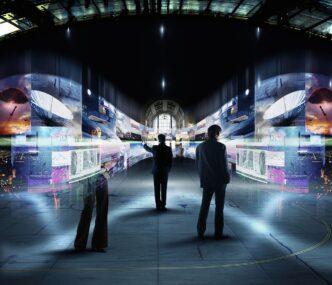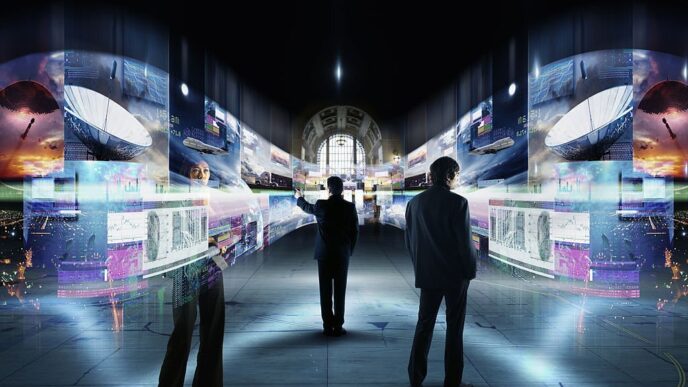Emerging technologies are changing the world in ways we have never seen before. The pace of technology is changing at the speed of light. We talk about how technology is seeping into every aspect of life, but several technologies are changing daily. New technologies are leading us into an exciting new age, from cutting-edge innovation to radical breakthroughs. In this article, we look at 5 ways new technologies are changing our daily lives.
1. Smart Home Devices
In the past couple of years, our living spaces have become the focus of emerging technologies. These are technologies we use to make life easier and better for us. Smart home devices using AI and IoT enable devices to bring ease and efficiency to household management.
What if your smart thermostat wakes you up and stops the heating or cooling to the desired temperature? It has intelligent lighting that will slowly and steadily brighten the lighting just like the sun rises, so you ensure you wake up on the right side of the bed. Studies show that automated home systems can cut your energy bill by as much as 30%. They are also cost-effective and environmentally friendly.
2. Wearable Tech Enhancing Health and Wellness
Imagine a watch that keeps time and serves as your personal health assistant. It’ll nudge you to stand up, drink water to hydrate yourself, and check your heartbeat in real time. Have fun with the revolution of wearable tech that brings wellness to you. Over the years, fitness trackers and smartwatches have helped change our approach to health with features that are now part of a daily possibility of advanced and once sci-fi movie technology.
According to a recent report, the wearable tech market is set to reach $62 billion by 2025. These devices give us a glimpse into a wider spectrum of health beyond simple counts of steps. And we’re not talking about heart rate or blood oxygen levels, but stress indicators! Such data allows individuals to keep an eye on their fitness level and make decisions on their health.
These smart devices help you approach health proactively by tracking fitness activity and sleep patterns. In fact, they alert users about irregularities and offer actionable insights to improve well-being. For example, a study from Stanford University showed that because wearables can monitor vitals so intimately, they can predict health outcomes.
3. Blockchain Reengineering Financial Transactions
Beyond the hype of cryptocurrencies, blockchain technology has quietly transformed how financial transactions are made. A world where every time you send coins to someone, they are traced in a transparent, secure and decentralized manner and not by Big Brother. That’s the promise of blockchain. The financial sector is finally benefiting from this emerging technology, which brings in a whole new level of trust security.
But how does this emerging technology modify financial transactions? Here are a few ways:
Data Integrity: Once recorded on Blockchain, data is impossible to alter without detection. IBM says that blockchain’s immutable ledger system has the capacity to eliminate discrepancies and hasten reconciliation, ensuring that error-prone, human-driven processes are a thing of the past.
Fraud Reduction: Blockchain is decentralized, making the ledger very difficult to tamper with or do any kind of fraud on. Transactions are encrypted and as such have lesser potency of fraud, virtually eliminating the need for third parties to intermediating.
Increased Transparency: The public can access the distributed ledger in which each transaction of blockchain is written on. It also means that anyone with access can follow the history of transactions, being an unprecedented amount of transparency.
Cost Efficiency: Blockchain eliminates the need for use of banks and clearinghouses, slashing financial transaction costs considerably.
4. AI-Powered Personal Assistants
Picture waking in the morning with coffee brewed and your emails organized and your day planned, all before you even open your eyes. Sounds like science fiction, right? It is becoming common as we have all benefited from AI personal assistants one way or another.
Siri, Alexa, and Google Assistant aren’t just a fancy, they are powerful AI that is revolutionizing the way we schedule our life, remind us things and solve mundane tasks.
These high tech tools have already become indispensable for keeping up productivity level and organization of daily activities. A recent survey found 55% of US adults use voice assistants and that usage is growing as features continue to be more advanced and integrated.
5. Augmented Reality (AR)
You enter into a store and in no more than 10 minutes, can try on several outfits without ever stepping into a changing room. Soon, you will see the magic of Augmented Reality (AR) one of the hottest emerging technologies that is completely transforming the retail world. With AR, consumers can engage with products in a way that’s highly personalized but also feels futuristic, without having to even leave their homes or walk into the world of an AR-enhanced store.
AR technology allows consumers to try stuff on virtually: clothes, accessories, and even makeup. Not only is this emerging technology just for clothing, this goes towards home decor, allowing you to get a virtual preview of how the furniture or a new paint color will look in your living space. A Gartner study estimates that AR, once introduced in retail, could diminish product returns by 25 percent by 2025, helping any retailer’s bottom line.
AR allows customer satisfaction to be enhanced and also turns the shopping journey into an exciting virtual experience.


















